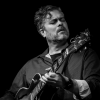Home » Jazz Musicians » Paul Simon
Paul Simon
During his distinguished career Paul Simon has been the recipient of many honors and awards including 12 Grammy Awards, three of which (”Bridge Over Troubled Water”, “Still Crazy After All These Years” and “Graceland”) were albums of the year. In 2003 he was given a Grammy Lifetime Achievement Award for his work as half of the duo Simon and Garfunkel. He is an inductee of The Songwriters Hall of Fame and is in the Rock n' Roll Hall of Fame both as a member of Simon and Garfunkel and as a solo artist. His song “Mrs. Robinson” from the motion picture “The Graduate” was named in the top ten of The American Film Institute's 100 Years 100 Songs. He was a recipient of The Kennedy Center Honors in 2003 and was named as one of Time Magazine's “100 People Who Shape Our World” in 2006.
Of Simon's many concert appearances he is most fond of the two concerts in Central Park in New York (with his partner and childhood friend Art Garfunkel in 1981 and as a solo artist in 1991) and the series of shows he did at the invitation of Nelson Mandela in South Africa: the first American artist to perform in post-apartheid South Africa.
Paul Simon's philanthropic work includes the co-founding of The Children's Health Fund with Dr. Irwin Redlener. The CHF donates and staffs mobile medical vans that bring health care to poor and indigent children in urban and rural locations around the United States. In the twenty years since its inception it has provided over 1,200,000 doctor /patient visits. In the wake of Hurricanes Andrew and Katrina it was the primary health care source for those communities decimated by the storms. Mr. Simon has also raised millions of dollars for worthy causes as varied as AMFAR, The Nature Conservancy, The Fund for Imprisoned Children In South Africa and Autism Speaks. In 1989 The United Negro College Fund honored him with its Frederick D. Patterson Award.
On May 23rd, 2007, Simon was the recipient of the first annual Library of Congress Gershwin Prize for Popular Song. Named in honor of the legendary George and Ira Gershwin, this newly created award recognizes the profound and positive effect of popular music on the world’s culture, and will be given annually to a composer or performer whose lifetime contributions exemplify the standard of excellence associated with the Gershwins.
Early Career
In early 1964, Simon and Garfunkel got an audition with Columbia Records, whose executives were impressed enough to sign the duo to a contract to produce an album. According to a February 2001 writing from Bud Scoppa, Miles Davis was a member of the Columbia Records staff that offered the duo a record deal.[citation needed] Columbia decided that the two would be called simply “Simon & Garfunkel,” which Simon claimed in 2003, was the first time that artists' ethnic names had been used in pop music.
Read moreTags
Paul Simon at Flushing Meadows Corona Park

by Mike Perciaccante
Paul Simon Flushing Meadows Corona Park Homeward Bound: The Farewell Performance Flushing, NY September 22, 2018 “Hello, my friends!"--so began Paul Simon's farewell concert, held in the New York City borough where it all began. The location, Flushing Meadows Corona Park, was the site of two World's Fairs (1939 and 1964), and is, according to Simon, a twenty-minute bicycle ride from where he grew up. The two-and-a-half-hour, career-spanning concert represented a perfect ...
Continue ReadingPaul Simon: In The Blue Light

by Mike Jurkovic
To this very day, as he readies the last shows of his Homeward Bound tour, Paul Simon's new is as new as his old once was. When your most maligned works, 1980's One Trick Pony (Warner Brothers), 84's dark epic Heart and Bones (Warner Brothers), and 97's errant Songs From The Capeman (Warner Brothers, 1997) yields such lasting beauty as “Late in The Evening," “Hearts and Bones," “The Late, Great Johnny Ace," “The Vampires," and “Adious Hermanos," a severe re-assessment ...
Continue ReadingPaul Simon: In The Blue Light

by Nenad Georgievski
It's not unusual for artists to re-record a song or two from their past oeuvre. Actually, the history of music is replete with artists revisiting their past achievements. This goes all the way to the era of crooners, and one can see singers like Frank Sinatra or Tony Bennett offering different takes on same songs in different settings at different times. Even though this is a new era, the process of revisiting and re-creating past songs and even entire albums ...
Continue ReadingPaul Simon: The Complete Albums Collection

by John Kelman
If the history books were to be closed on singer/songwriter Paul Simon's career today, he'd have already left a legacy more than sufficient to ensure a substantial chapter. While other emergent songwriters of his day--Leonard Cohen, Bob Dylan and Randy Newman amongst them--have clearly evolved over the years, there's been an underlying approach that's remained consistent across, in many cases, half a century. That's not to dismiss or denigrate these icons of song, only to say that Simon has emerged ...
Continue ReadingPaul Simon: So Beautiful or So What

by John Kelman
After successful run at self-producing, yielding hits like Graceland (Warner Bros., 1986) and The Rhythm of the Saints (Warner Bros., 1990), Paul Simon reunites with Phil Ramone for So Beautiful or So What, the singer/songwriter's first album since the largely overlooked Surprise (Warner Bros., 2006). Ramone last worked with the singer/songwriter on One Trick Pony (Warner Bros., 1980), but was responsible for producing many of Simon's early hits from the 1970s. After breaking out with the iconic ...
Continue ReadingSimon & Garfunkel: Live 1969

by Chris M. Slawecki
Recorded during performances in October and November '69 for what was supposed to be the live album follow-up to Bridge Over Troubled Water (which the duo had recorded before these concerts but was not yet released on Columbia), Paul Simon and Art Garfunkel capture on Live 1969 the mood of their generation changing. That live album never came out (until now) because during those dates their mystic musical communion was disintegrating, although you'd never know that from its joyful sound.
Continue ReadingPaul Simon: Surprise

by John Kelman
Paul Simon has been exploring and adapting his songwriting to the music of other cultures since the mid- 1980s, but strip away the arrangements from this material and you still have Paul Simon the singer/songwriter. The same can be said about Surprise. Instead of the world music stylings of Graceland (Warner Bros., 1986) or You're the One (Warner Bros., 2000), Simon radically shifts gears here. Collaborating with veteran producer/sonic landscaper Brian Eno, he has produced an entirely contemporary album that ...
Continue ReadingPaul Simon To Release New Album – In The Blue Light – On September 7 Coinciding With Final Leg Of Homeward Bound – The Farewell Tour

Source:
All About Jazz
“This album consists of songs that I thought were almost right, or were odd enough to be overlooked the first time around. Re-doing arrangements, harmonic structures, and lyrics that didn’t make their meaning clear, gave me time to clarify in my own head what I wanted to say, or realize what I was thinking and make it more easily understood.”—Paul Simon, July 2018 Legendary songwriter, recording artist and performer Paul Simon will release his 14th studio album—In The Blue Light—on ...
read more
Paul Simon's "Graceland" 25th Anniversary Editions to be Released June 5th

Source:
Sony Music Entertainment/Legacy
25th ANNIVERSARY OF PAUL SIMON'S GRACELAND CELEBRATED WITH THEATRICAL SCREENINGS AND PRIMETIME TELEVISION SPECIAL OF “UNDER AFRICAN SKIES" DOCUMENTARY; RELEASE OF 25TH ANNIVERSARY EDITIONS: CD/DVD, BOX SET, VINYL AND BLU-RAY DISC “Under African Skies," New Documentary About Graceland From Two-Time Emmy, Peabody Award Winner And Oscar Nominated Filmmaker Joe Berlinger A Premiere Television Event on A&E Following Limited Theatrical Run Graceland 25th Anniversary Editions on Legacy Recordings To Be Released June 5th The 25th anniversary of Graceland, Paul Simon's groundbreaking ...
read more
New Documentary Explores the Making of Paul Simon's Graceland, 25 Years Later

Source:
Something Else!
"Under African Skies," a new documentary from Joe Berlinger on the making of Paul Simon's Graceland, will debut on Jan. 22 at the 2012 Sundance Film Festival. The premiere kicks off a year-long celebration of the groundbreaking album's 25th anniversary. That includes a commemorative edition deluxe collector's box set as well as a special two-disc set from Legacy Recordings this spring, each featuring the original album with bonus tracks and the director's cut of “Under African Skies." Graceland eventually sold ...
read more
Paul Simon: Songwriter 2-Disc Collection out 10/24

Source:
JamBase
2 DISC SET ILLUMINATES SIMON'S EVOLUTION FROM 1960S TO PRESENT Songwriter is a selection of songs, chosen by the composer, as the best of his decades-long creative output. Some of these are well-known hits and others more obscure works, but all bear the distinct lyrical, melodic and rhythmic signature of Paul Simon, one of the great composers of popular song in the last 50 years. As Simon has said, “I think of myself as a songwriter first, the recording artist ...
read more
Paul Simon: Fall U.S. Tour

Source:
JamBase
MORE DATES TO BE ANNOUNCED SOON Paul Simon has announced the first part of his Fall US Tour. The tour starts October 17 in Phoenix and includes stops in Berkeley, San Diego, Las Vegas, Broomfield, New Orleans, and more. Tickets to the general public will go on sale first for the shows in Phoenix (on sale September 12) and Berkeley (on sale September 11). Click here for more information. Paul Simon Tour Dates
10/17/11 Mon Comerica Theatre Phoenix, AZ 10/19/11 ...
read more
Paul Simon - So Beautiful or so What (2011)

Source:
Something Else!
By Nick DeRiso Paul Simon's new record, his first since 2006's dense Brian Eno-collaboration Surprise, is a career-spanning, sometimes duskily ruminative, quirk-splashed triumph—simultaneously bold in its constructions and timeless in its themes. There's a freedom, perhaps, that comes from going it alone: After 30 years with Warner Bros., Simon paid for the lengthy sessions that eventually produced So Beautiful or So What, then signed with the Concord Music Group. The album is due out on Tuesday; a sold-out tour of ...
read more
Paul Simon Adds Club Dates

Source:
JamBase
HOW THE AUDIENCE APPROACHES WHAT IT YEARNS Paul Simon has added club dates in select cities to his recently announced, largely sold-out spring theater tour. The added shows offer fans a chance to see the iconic artist and his stellar band in more intimate, personal settings. “I'm going to play 3,000 seat theaters and also clubs," Simon told Rolling Stone. “I want to play several songs from the new album and music from my repertoire that I either haven't played ...
read more
Paul Simon - The Essential Paul Simon (2007)

Source:
Something Else!
By Mark Saleski Paul Simon's career has something that is becoming quite rare in the entertainment world: longevity. Yes, the songs on this collection span over three decades. During that time period our culture, the music biz, and Simon himself have seen great changes. So has every one of us. For instance, at the beginning of this thirty year period, I could not have been called a Paul Simon fan. I had no use for Simon and Garfunkel and considered ...
read more
Paul Simon: U.S. Tour

Source:
JamBase
TOUR STARTS APRIL 15 IN SEATTLE, WA; JIMMY FALLON PERFORMANCES APRIL 6- 7 To celebrate the release of his first new record in five years, legendary artist Paul Simon has announced a very special North American tour beginning Friday, April 15 in Seattle, Washington. Included in the set will be songs from So Beautiful or So What, his brand new album set for release by Hear Music/Concord Music Group on Tuesday, April 12, 2011. Before hitting the road, Simon will ...
read more
Listen up Preview: Paul Simon, "The Afterlife" (2011)

Source:
Something Else!
By Nick DeRiso “The Afterlife," featured on Paul Simon's forthcoming album So Beautiful or So What, is pulsing and sinewy—almost like a lost track from Graceland. Not that there's anything wrong with that. See, Simon has said the premise of this new recording was to get away from the rhythmic focus he'd had since that late 1980s smash, to focus more on singer-songwriterly guitar-based tracks. And he certainly did that on the advance cut “Getting Ready for Christmas Day," a ...
read more



































